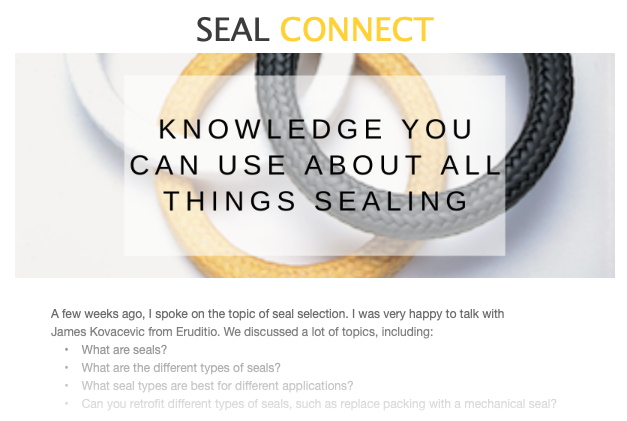Packing or Mechanical Seals – Which Solution is Right For You; A Case Study

Introduction:
Recently, SEPCO was contacted by a Georgia-based specialty chemical group, an existing client, who wanted to explore the idea of converting some of their pumps from packing to mechanical seals. SEPCO provided a thorough evaluation of how to ensure the most successful outcome. This case study outlines the implementation of mechanical seals and the experience of this manufacturer. Keep in mind that some operations may require an either-or approach. Mechanical seals and packing are not one size fits all.
Challenges:
It is finding the balance between the pumps and processes that would benefit the most from conversion while recognizing that many pumps may not be ideal candidates for conversion.
Objectives:
To address the challenges and improve pump reliability, this chemical processor set the following objectives for the implementation of mechanical seals:
- Eliminate Leakage Where Possible: Switch to a sealing solution that provides a leak-free performance while reducing product losses and environmental impact.
- Extend Maintenance Intervals: Adopt a sealing method that requires less frequent maintenance, leading to increased pump uptime and improved production efficiency.
- Enhance Equipment Performance: Improve pump efficiency and reduce energy consumption with a reliable and efficient sealing solution.
Solution:
The chemical manufacturer collaborated with SEPCO, a leading sealing solutions provider, to select and implement mechanical seals as an alternative to pump packing.
Results:
The implementation of mechanical seals on many of the pumps resulted in significant improvements for this plant:
- Leak-Free Operation: Mechanical seals eliminated pump leakage, preventing product losses and ensuring compliance with environmental regulations.
- Reduced Downtime: Longer maintenance intervals and reduced need for adjustments increased pump uptime, optimizing production schedules.
- Improved Energy Efficiency: The enhanced pump efficiency achieved with mechanical seals reduced energy consumption and lowered operational costs.
- Enhanced Product Quality: The elimination of contaminant ingress improved product quality and reduced equipment wear.
Conclusion:
Switching from industrial pump packing to mechanical seals proved to be a transformative decision for the chemical processing group. The adoption of mechanical seals resulted in an efficient and reliable sealing solution. This plant experienced improved pump performance and reduced maintenance requirements. By embracing mechanical seals on some of its pumps, this plant achieved its objectives of efficiency, reliability, and cost-effectiveness, solidifying its reputation as a leader in manufacturing excellence.
Considerations:
Choosing between pump packing and mechanical seals depends on several factors, including the specific application, the nature of the fluid being pumped, the operating conditions, equipment condition, and the desired level of sealing performance. Below are some of the key considerations SEPCO recommends using to help make an informed decision on which sealing solution is right for you:
- Nature of the Fluid:
- For abrasive or solid-laden fluids: Mechanical seals may be more suitable; they can provide an effective seal and be less prone to wear from abrasives.
- For non-abrasive fluids: Pump packing can be an effective and cost-efficient option, but when applied, installed, and maintained correctly can also handle abrasives.
- Leakage Tolerance:
- If low leakage is a critical requirement, mechanical seals are effective in providing a tight seal and reducing the risk of fluid leakage.
- Generally, pump packing needs a certain level of controlled leakage for a long-running life, which can be acceptable in certain applications.
- Cost Considerations:
- Pump packing is generally more economical upfront, but it may require more maintenance compared to mechanical seals, which can impact long-term costs.
- Ease of Installation and Maintenance:
- With the right training, pump packing is relatively easy to install and requires minimal equipment adjustments during installation or replacement.
- Mechanical seals can be more complex to install and may require specific tools and expertise for proper alignment and setup.
- Environmental and Safety Requirements:
- In applications where environmental safety and emission control are crucial, mechanical seals are often preferred, as they can provide a higher level of containment and reduce fugitive emissions.
- Reliability and Maintenance Intervals:
- Mechanical seals generally have longer maintenance intervals and may require less frequent replacement compared to pump packing.
SEPCO can help you assess the operating conditions, fluid characteristics, and other critical factors to determine whether pump packing or a mechanical seal is the best choice for your pumps.
Looking for a Sealing Solutions Provider?
SEPCO has sealing solutions for many applications, even those with the strictest standards and the most challenging environments. We have decades of experience in providing solutions across multiple industries. We can help. Check out our website to browse all of our products.
 SEAL CONNECT
SEAL CONNECT Find Your Sealing Solution
Find Your Sealing Solution